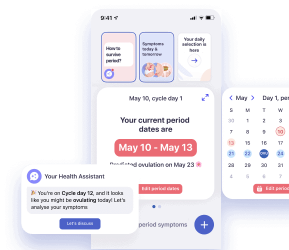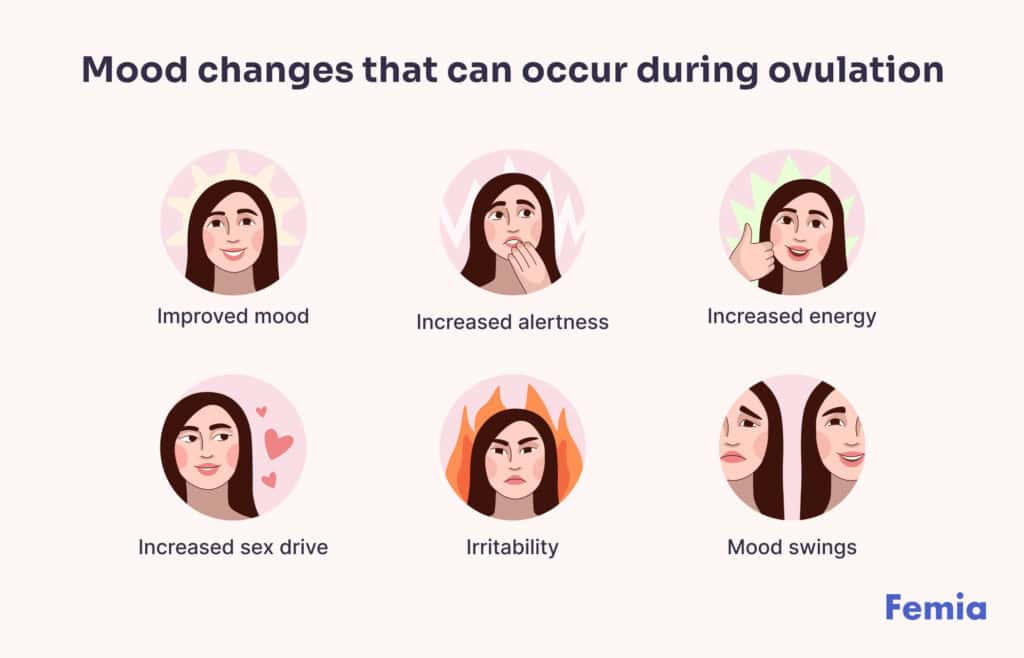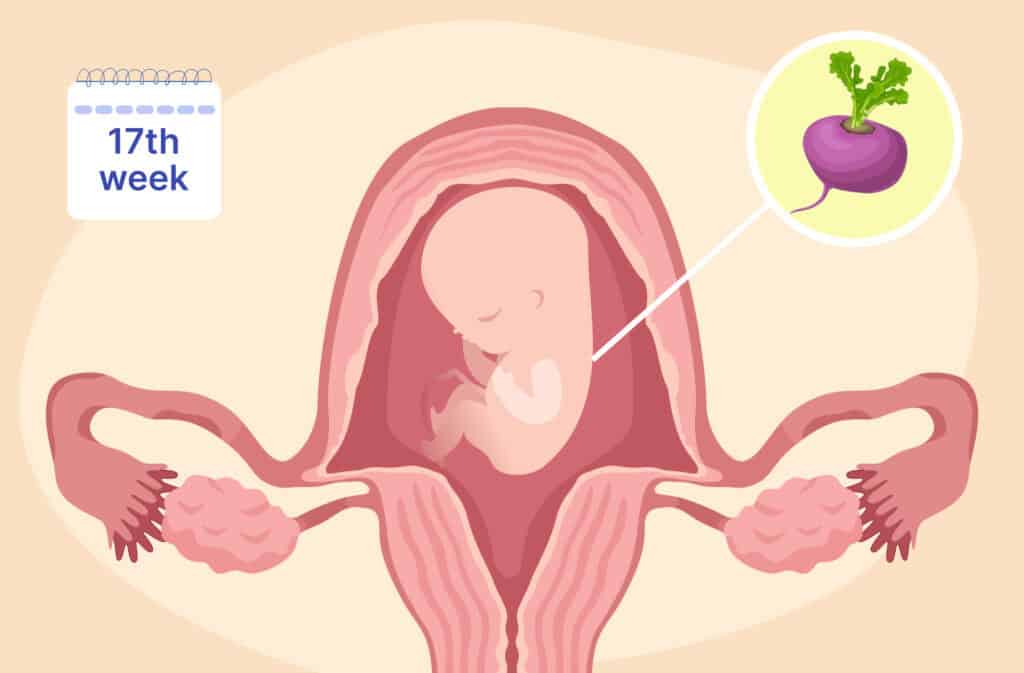Femia > Health Library > Your cycle > Health > Does ovulation make you emotional? Understanding mood swings
Does ovulation make you emotional? Understanding mood swings

- Updated Mar 2, 2025
- Published
CRAFTED BY HUMAN
Crafted by human At Femia, we provide accurate and up-to-date information at every stage of your journey, from trying to conceive, pregnancy and postnatal support. All content is created by a real person based on in-depth research and own professional experience. Femia ensures that you will receive expert advice, strict accuracy and a personalized approach from our authors/medical experts. Learn more about our editorial policy.
FACT CHECKED
Fact checked At Femia Health, we maintain the highest standards of editorial excellence in delivering content focused on helping you conceive, guiding you through pregnancy, and supporting you postpartum. Explore our content review principles to learn how we ensure the accuracy and quality of our health and lifestyle tips for every stage of your journey.
- A surge in hormones during ovulation can cause mood swings and emotional sensitivity.
- Ovulation mood swings can lead some women to feel more energized and alert while others can feel more anxious and irritable. It is also completely normal to not notice any change in mood at all.
- Adapting your diet, exercise, sleep, and managing your stress levels can help you to minimize mood swings during your cycle.
- Using an app like Femia to track ovulation can help you link any mood changes with hormonal fluctuations during your menstrual cycle.
Ovulation can cause mood swings and changes in your emotions. Similar to the mood swings you can get before your period, these fluctuations are driven by your hormones.
Ovulation-related mood changes are normal, though not everyone experiences them. But, if you’ve noticed that you’re more emotional around the same time each month – about two weeks before your period is due – ovulation could be the cause.

Hormonal changes during ovulation
Every month your body goes on a journey, we call it the menstrual cycle. It lasts on average 28 days, but anywhere from 21-35 days is normal. In the middle of the menstrual cycle, usually around 14 days before your next period is due, your ovaries release an egg. This is called ovulation.
There are four main hormones involved in the menstrual cycle, two are released by the ovaries: estrogen and progesterone. And two are released by the pituitary gland in the brain: luteinizing hormone (LH), and follicle-stimulating hormone (FSH).
Just before ovulation, estrogen levels rise, triggering the pituitary gland to release a surge of LH. Around 36 hours after the start of the LH surge, an egg is released by the ovaries. These mid-cycle hormone surges don’t just affect your ovaries, they can also impact your mood, energy levels, and appetite.
Why ovulation affects your mood
Hormonal fluctuations during the menstrual cycle can affect your mood, sex drive (libido), sleep, appetite, and energy levels. While it’s not yet clear why this happens, it could be because fluctuations in hormone levels impact how the brain functions, influencing emotions.
The connection between ovulation and mood changes isn’t as well-documented as the emotional changes many women experience before their period (premenstrual syndrome or PMS). But, there has been some research looking at the link between ovulation and emotional changes.
- A 2021 systematic review found that hormone fluctuations during the menstrual cycle can affect the structure and function of your brain.
- A small 2017 study found that just before ovulation women reported higher levels of alertness, attentiveness, enthusiasm, and higher activity levels.
- A recent 2024 study, published in the scientific journal, Nature, found that the rise in estrogen before ovulation boosts activity in a region called the hippocampus in your brain. This region is responsible for memory and learning.
So, what mood changes during ovulation can you experience?
Common emotional symptoms during ovulation

Here are some common mood changes that can occur during ovulation:
- Improved mood. Estrogen can boost serotonin levels in your brain, improving your overall emotional well-being.
- Increased alertness. As your hippocampus gets a boost in activity you might find yourself feeling more alert and your memory improved.
- Increased energy. Estrogen levels can affect your energy levels. As they peak you might notice feeling particularly energetic.
- Increased sex drive. Rising LH and estrogen levels, paired with a boost in energy, can lead to some women desiring more sex around ovulation.
- Irritability and mood swings. Once the egg has been released, LH and estrogen levels drop again. This drop can cause irritability and mood swings.
Emotional symptoms and ovulation mood changes will vary from woman to woman, and some women won’t notice any changes at all. This is also completely normal and doesn’t mean you’re not ovulating.
👉Find out more: Does stomach pain after sex mean you are pregnant?
Why some people feel more emotional than others
Some women will notice more emotional changes during their menstrual cycle than others, this can be due to a combination of factors that shape how their mind and body respond to hormonal shifts. Here’s a breakdown:
- Genetic factors: Sometimes your genes can influence how sensitive you are to hormonal changes. According to researchers at the National Institute of Health, there could be a genetic cause behind premenstrual dysphoric disorder (PMDD). PMDD is when you have an extreme reaction to the hormonal changes before your period and can result in extreme mood swings, irritability, anxiety, and depression.
- Diet and exercise: Diet and exercise can influence your body’s response to hormonal changes during the menstrual cycle. A 2023 study published in Frontiers in Nutrition explored the link between diet and PMS. It found that certain foods can reduce menstrual cycle-linked mood swings and irritability.
- Sleep: Sleep can impact your mood, energy levels, and concentration regardless of your hormone levels. But, during your menstrual cycle, poor sleep could enhance how sensitive you are to hormone fluctuations.
- Mental health: If you suffer from a mental health disorder then hormonal changes during the menstrual cycle can exacerbate your symptoms.
- Stress: Stress levels can impact your mood, sleep, energy levels, and even your menstrual cycle. If you have high stress levels then you could be even more susceptible to the emotional disturbance that fluctuating hormone levels can cause.
How to control mood swings during ovulation
If you have noticed that your emotions fluctuate over your menstrual cycle and are looking for a way to balance your mood, here are some practical tips you can try at home:
Diet and lifestyle tips
- Align your diet with your body’s needs. If ovulation boosts your energy levels and you find yourself moving more, then syncing your diet to this phase of the menstrual cycle is key. Include protein-rich foods to support increased exercise and include foods high in Omega-3, like salmon and tuna, to help stabilize mood swings caused by hormonal fluctuations.
- Exercise regularly to help balance your hormones, you may be feeling particularly energetic around ovulation so it can be a good time to incorporate higher-energy workouts.
- Get enough sleep to give your mind and body the best chance of managing any hormone-related mood swings.
- Track your cycle using an app like Femia or with a handwritten diary. Note down your energy levels, mood and physical symptoms over a few cycles to help you find patterns.
- Avoid alcohol and drugs. These substances are well-known for their ability to cause severe mood swings and heighten your emotions. Steering clear, especially during times of the month when you’re more vulnerable to mood changes, can help you to keep your emotions balanced.
- Consider menstrual cycle syncing. This new and emerging wellness practice is helping women to align their lifestyle with their menstrual cycle to enhance their health, productivity, and well-being.
Stress management strategies
Managing stress is key for both a healthy body and mind, here are a few simple ways you can keep your stress level in check:
- Incorporate stress-reducing techniques, such as mindfulness or deep breathing exercises, into your daily routine. Just 10 minutes a day can help establish this habit and support your mental health.
- Prioritize ‘me time’ by doing something you enjoy. Whether that’s reading a book, meeting up with friends, or taking a trip, it can make a world of difference to your stress levels and mood.
- Build connections with people so that you have a strong support network. It’s normal to go through periods where you feel more stressed and having trusted people around to talk to can help you to navigate through these tough times.
Supplements and medications
Sometimes supplements and medications can help to balance your hormones and manage mood swings and emotional changes during your menstrual cycle.
- Omega-3: If you can’t reach the recommended daily amount of omega-3 through diet alone then supplements can help you to maximize your intake. This nutrient can help reduce symptoms of hormonal fluctuations during your cycle.
- Magnesium: Helps regulate neurotransmission in the brain and a magnesium deficiency has been linked to depression, anxiety, and irritability.
- Medications: Sometimes a healthcare provider might prescribe you medication to help regulate your hormones and balance your moods. Hormonal birth control can prevent the surges of hormones associated with ovulation and in severe cases antidepressants can be used to manage symptoms of PMDD.
Always consult a healthcare provider before starting new supplements or medications. Some supplements can interact with medications or medical conditions, so personalized advice is essential.
When to see a doctor about emotional changes
If your mood swings or emotional changes are severe, disrupt your daily life, or are accompanied by other concerning symptoms like headaches, pain, or nausea then it’s important to reach out to a trusted healthcare provider.
Several different conditions can affect your mood and while many of these can be mild, some might need further investigation or treatment. Conditions such as PMDD can significantly impact your personal life, relationships, and work life but there is treatment available that can help you manage its symptoms.
👉Find out more: How to balance your hormones in a week: Natural strategies for quick results
Track your ovulation with Femia
Using a menstrual cycle app like Femia can help you track ovulation, predict your next period, and monitor your mood changes throughout the month.
Over time, you’ll get a clearer picture of your fertility and how your menstrual cycle affects your mood, emotions, sleep, and energy levels.
This can help you to feel healthier, both mentally and physically.

Questions from the Femia community
How long do mood swings during ovulation last?
Mood swings during ovulation typically last 1-2 days, coinciding with the hormonal surge that occurs when an egg is released. However, it can vary from woman to woman. Some won't notice any changes in mood while for others it will be more obvious.
Factors like stress levels, mental health and sleep can all impact how sensitive you are to hormonal fluctuations.
What’s the difference between ovulation mood swings and PMS?
Ovulation mood swings are mood changes that occur mid-cycle, around the time you ovulate.
PMS are mood changes and physical symptoms that occur just before your period starts.
Ovulation mood swings are likely due to a surge in LH and estrogen, whereas PMS is linked to a drop in estrogen and progesterone.
Can ovulation make me feel anxious?
Yes, hormonal fluctuations during ovulation, particularly changes in estrogen and serotonin levels, can contribute to feelings of anxiety.
However, tracking your symptoms alongside your menstrual cycle can help you identify patterns and timing.
Self-care methods like mindfulness, yoga, and exercise can help you to manage anxiety at home. However, if your feelings of anxiety interfere with your daily life, reach out to a healthcare provider who can offer personalized advice and treatment.
The bottom line
Mood swings and changes in your emotions are a common occurrence during the menstrual cycle. Feeling more emotional, or noticing a change in your mood in the middle of your cycle might be linked to ovulation. A rise in the hormones estrogen and LH can affect how you feel, your energy levels and your general well-being.
Start by tracking your cycle, this can help you to notice any links between your mood and menstrual cycle.
Practicing good self-care by eating a balanced diet, regularly exercising, and making sure you get enough sleep can help you manage your symptoms at home.
Sometimes you might need some extra support. If you feel your mood swings or emotional changes are affecting your daily life, or you have other symptoms alongside them, then talk to your healthcare provider. They will be able to offer any further testing or medication that you might need and help you to manage your mood.
References
- “Abnormal Uterine Bleeding.” ACOG, www.acog.org/womens-health/faqs/abnormal-uterine-bleeding.
- Author, Femia. “Cycle Syncing Diet: Eat in Harmony With Your Menstrual Cycle | Femia.” Femia Health, 17 Oct. 2024, femia.health/health-library/your-cycle/health/cycle-syncing-diet.
- “Cycle Syncing: Optimize Your Lifestyle With Your Menstrual Cycle Phases.” Femia Health, 22 Oct. 2024, femia.health/health-library/your-cycle/health/cycle-syncing-optimize-lifestyle-menstrual-phases.
- “Does Ovulation Make You Horny? Science Behind Increased Libido | Femia.” Femia Health, 17 Sept. 2024, femia.health/health-library/your-cycle/sex/does-ovulation-make-you-horny.
- “What Is the Ovulation Phase: Everything You Need to Know – Femia.” Femia Health, 8 Oct. 2024, femia.health/health-library/your-cycle/health/ovulation-phase.
- Bendis, Peyton Christine, et al. “The Impact of Estradiol on Serotonin, Glutamate, and Dopamine Systems.” Frontiers in Neuroscience, vol. 18, Mar. 2024, https://doi.org/10.3389/fnins.2024.1348551.
- “Best App for Getting Pregnant — Femia.” Femia Health, 15 Nov. 2024, femia.health/products/getting-pregnant-app.
- Department of Health & Human Services. “Mood and Sleep.” Better Health Channel, www.betterhealth.vic.gov.au/health/healthyliving/Mood-and-sleep.
- “Ovulation and Fertility.” Better Health Channel, www.betterhealth.vic.gov.au/health/conditionsandtreatments/ovulation.
- Dubol, Manon, et al. “Neuroimaging the Menstrual Cycle: A Multimodal Systematic Review.” Frontiers in Neuroendocrinology, vol. 60, Oct. 2020, p. 100878. https://doi.org/10.1016/j.yfrne.2020.100878.
- Handy, Ariel B., et al. “Psychiatric Symptoms Across the Menstrual Cycle in Adult Women: A Comprehensive Review.” Harvard Review of Psychiatry, vol. 30, no. 2, Mar. 2022, pp. 100–17. https://doi.org/10.1097/hrp.0000000000000329.
- Lyu, Chen, et al. “Magnesium Intake Was Inversely Associated With Hostility Among American Young Adults.” Nutrition Research, vol. 89, Apr. 2021, pp. 35–44. https://doi.org/10.1016/j.nutres.2021.01.001.
- Nagma, Shahida, et al. “To Evaluate the Effect of Perceived Stress on Menstrual Function.” JOURNAL OF CLINICAL AND DIAGNOSTIC RESEARCH, Jan. 2015, https://doi.org/10.7860/jcdr/2015/6906.5611.
- “Physical Activity and Your Menstrual Cycle | Office on Women’s Health.” OASH | Office on Women’s Health, www.womenshealth.gov/getting-active/physical-activity-menstrual-cycle.
- Pletzer, Belinda, et al. “The Cycling Brain: Menstrual Cycle Related Fluctuations in Hippocampal and Fronto-striatal Activation and Connectivity During Cognitive Tasks.” Neuropsychopharmacology, vol. 44, no. 11, June 2019, pp. 1867–75. https://doi.org/10.1038/s41386-019-0435-3.
- Premenstrual dysphoric disorder. www.hopkinsmedicine.org/health/conditions-and-diseases/premenstrual-dysphoric-disorder-pmdd.
- Professional, Cleveland Clinic Medical. “Hippocampus.” Cleveland Clinic, 25 Nov. 2024, my.clevelandclinic.org/health/body/hippocampus.
- “Ovulation.” Cleveland Clinic, 1 May 2024, my.clevelandclinic.org/health/articles/23439-ovulation.
- Rebollar, Ana Ocampo, et al. “Comparison of Affect Changes During the Ovulatory Phase in Women With and Without Hormonal Contraceptives.” Heliyon, vol. 3, no. 4, Apr. 2017, p. e00282. https://doi.org/10.1016/j.heliyon.2017.e00282.
- Reed, Beverly G., and Bruce R. Carr. “The Normal Menstrual Cycle and the Control of Ovulation.” Endotext – NCBI Bookshelf, 5 Aug. 2018, www.ncbi.nlm.nih.gov/books/NBK279054.
- “Sex Hormone-sensitive Gene Complex Linked to Premenstrual Mood.” National Institutes of Health (NIH), 3 Jan. 2017, www.nih.gov/news-events/news-releases/sex-hormone-sensitive-gene-complex-linked-premenstrual-mood-disorder.
- Siminiuc, Rodica, and Dinu Ţurcanu. “Impact of Nutritional Diet Therapy on Premenstrual Syndrome.” Frontiers in Nutrition, vol. 10, Feb. 2023, https://doi.org/10.3389/fnut.2023.1079417.
- Website, Nhs. “10 Stress Busters.” nhs.uk, 11 Dec. 2023, www.nhs.uk/mental-health/self-help/guides-tools-and-activities/tips-to-reduce-stress.

Can you fly when pregnant? Click for an overview of flight safety during pregnancy, airline policies, and tips to ensure a smooth and safe flight!

Learn when ovulation returns after a miscarriage, how to track fertility, and tips to conceive faster, Understand key factors affecting recovery and cycle regularity.

Discover what’s happening at 17 weeks pregnant, from baby’s position and size to symptoms, ultrasound details, and helpful self-care tips.

